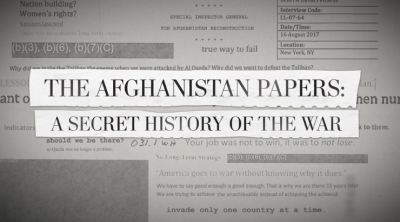What Everyone Is Missing About the Afghanistan Papers
We can't let the Afghanistan Papers obscure itself into nothingness.

If you need more proof that lawmakers in the U.S. couldn’t care less about America’s woeful commitment to human rights abroad—or even care about the public who vote them into office—look no further than the recent Afghanistan papers and the reaction to the publications from Congress.
According to the Washington Post, the outlet had obtained 2,000 pages of notes from interviews with more than 400 generals, diplomats, and other officials directly involved in the war. The documents showed that U.S. officials were lying about the progress being made in Afghanistan, lacked a basic understanding of Afghanistan, were hiding unmistakable evidence that the war had become unwinnable, and wasted close to $1 trillion in the process.
Barely a few hours following the Post’s publication, Congress rewarded the Pentagon for its stellar efforts with a $22 billion budget increase. How can we as a society justify this?
One stand-out statistic—among the many concerning ones—is the fact that before the U.S. invasion the Taliban had almost completely put to bed Afghanistan’s illicit opium trade. Since the U.S. invasion, combined with $9 billion in U.S. funding for anti-opium programs, the Taliban is not only stronger than it ever was but sits cemented in a country that now supplies 80 percent of the world’s opium.
I can’t help but think this was done on purpose.
Still, it would be worth re-thinking our outrage over the Afghanistan papers and determining what exactly it is we are outraged about. Are we simply angry because top U.S. officials lied to us about the fact they weren’t winning the war, making it a less worthwhile venture? If the U.S. were winning the war, spending $1 trillion in the process, killing record numbers of civilians, ramping up night raids to terrorize local populations, committing war crimes left right and center, would that suddenly make it all okay? As long as the war is being won, right?
The truth is, like most wars the U.S. finds itself prosecuting; this was yet another war based entirely on lies and misconceptions—right from the outset. As Marjorie Cohn, professor at Thomas Jefferson School of Law and president of the National Lawyers Guild famously said:
“The UN Charter is a treaty ratified by the United States and thus part of U.S. law. Under the charter, a country can use armed force against another country only in self-defense or when the Security Council approves. Neither of those conditions was met before the United States invaded Afghanistan. The Taliban did not attack us on 9/11. Nineteen men—15 from Saudi Arabia—did, and there was no imminent threat that Afghanistan would attack the U.S. or another UN member country. The council did not authorize the United States or any other country to use military force against Afghanistan. The U.S. war in Afghanistan is illegal.”
If that was the case in 2001, how this war has continued for close to another two decades begins to beggar belief. In that time, the consequences for the Afghan civilian population has been catastrophic.
In February of 2010, a NATO night raid conducted in a village in the Paktia province of Afghanistan left seven civilians dead, including two pregnant women. NATO tried to spin the raid as an attack on a compound festering with “militant activity,” but this quickly fell apart thanks to a British reporter, Jerome Starkey, who had already reported that this was a false narrative.
The compound actually belonged to an anti-Taliban policeman trained by the United States. At the time, the family had gathered to celebrate the naming of a newborn son. In order to cover the tracks of their reckless decision to execute unarmed civilians, the American troops used knives to dig out the bullets from the bodies of the pregnant women killed.
This is the kind of activity that trillions of dollars of U.S. taxpayer money has been paying for on a regular basis. More than 775,000 troops have served in Afghanistan, with 2,300 U.S. personnel deaths. Not to mention that the U.S. has not been fighting there alone, and has had assistance not just from NATO, but from so-called peaceful states like New Zealand as well (who have been accused of committing war crimes, too).
Yes, we should be outraged that officials lied about the prospects of success. But we should primarily be disturbed that they first and foremost lie in order to push our countries into these wars in the first place, killing countless innocent civilians over and over again.
We can’t let this recent publication obscure itself into nothingness. The recent reaction from Congress is a giant middle finger designed to tell you that (a) there will never be anything you can do about it and (b) they simply don’t care how you feel. Democracy at its finest from the world’s leading propagator of democratic values.
*
Note to readers: please click the share buttons above or below. Forward this article to your email lists. Crosspost on your blog site, internet forums. etc.
Featured image is from WaPo

